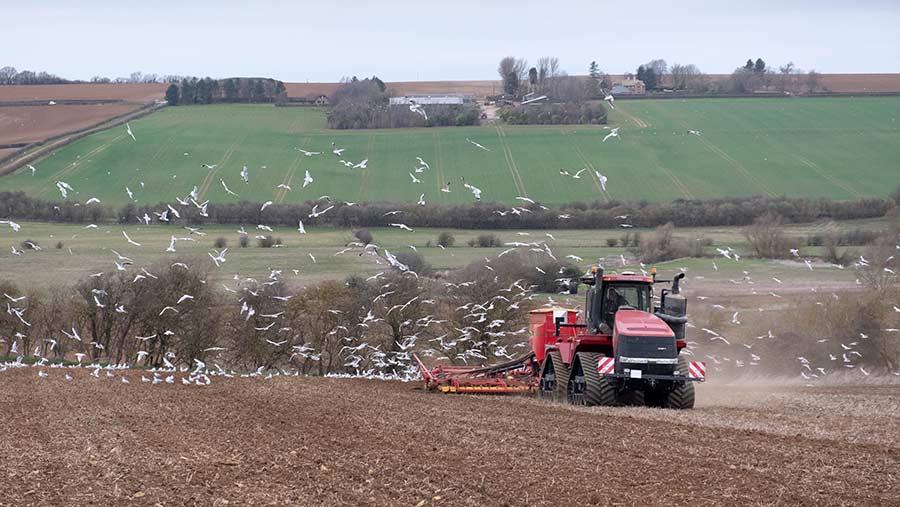Coronavirus: How to apply for universal credit
 © Tim Scrivener
© Tim Scrivener More farmers and self-employed workers will be eligible for universal credit during the coronavirus pandemic.
As part of the response to tackle the virus, the government is temporarily removing the minimum income floor from universal credit, which is a means-tested benefit.
The minimum income floor takes into account how much a person would normally expect to earn in a month, when calculating entitlement to universal credit.
See also: Coronavirus: Who is eligible for self-employed support?
During the coronavirus outbreak, new claimants will not need to attend the job centre to demonstrate gainful employment.
The allowance is set to increase on 6 April, with a claimant over 25 seeing an increase from £317.82 to £409.89/month.
The Self-Employment Income Support Scheme will be treated as earnings, so the universal credit payment will be adjusted to account for this income.
Eligibility
Universal credit is a payment to help with living costs for those in the UK on low income or out of work.
Claimants must be 18 or over (there are some exceptions) and under the state pension age (or their partner is), and have £16,000 or less in savings (between them and their partner).
How to apply
Universal credit applications can be made online. Applicants need to provide:
- Proof of identity
- Contact details
- Address
- National Insurance number
- Proof of nationality
- Housing details
- Details of anyone else who lives with you
- Employer details (if applicable)
- Details of any income, including other benefits
- Details of any savings, investment or capital you or your partner have
- Health information
- Details of the account payments will go into; which must be a current account in the applicant’s name
Those eligible may need to phone the universal credit helpline to book an interview with a work coach.
However, currently claimants are reporting difficulty with using this helpline due to the increase in demand.
Rachel Coates, tax manager at accountant Dodd & Co, said claims for universal credit increased by 832% after the chancellor’s announcement, from an average of 9,751 a day to 105,678 a day.
“I spoke to one person who had tried to ring more than 180 times and still had not managed to speak to someone,” she said. “The telephone lines are either continuously engaged or, if you do manage to get through, you can be on hold for up to four hours and even then occasionally you can simply be cut off mid-call.”
Instead, many new claimants are recommending leaving contact details on the online journal available on the universal credit account and asking for a call back.
Once the initial application has been completed, an appointment must be made with a member of the universal credit team to discuss and finalise the claim.
Again, as getting through on the phone is proving tricky, Ms Coates said the recommended advice is to leave a note in the online journal for the team to call to book an appointment or simply to arrange it and put the details in the journal.
How payments are made
Universal credit is a single payment made monthly. You can requests to have this paid more frequently, if necessary.
The money is normally paid directly into an account in your name, such as a bank, building society or credit union account.
It generally takes about five weeks for the first payment to be made. If this is too long to wait, it may be possible to get an advance.
“Using your universal credit account, you can request an advance payment, which will be paid to you within a week to help you pay bills at this difficult time,” said Ms Coates.
“You will need to pay the advance back, but not until after your monthly payments commence, so it can help with cashflow in the short term.”
Potential pitfalls
Those already receiving child or working tax credits cannot also receive universal credit payments, so claimants should check which system works best for them, said Ms Coates.
An online benefit calculator can be used to check how much universal credit a claimant is eligible for, without actually applying.
“You then need to carefully check this against the amount you are receiving under the tax credits system,” she said.
“If you apply for universal credit, your tax credits claim will cease and it will not be possible to reapply.”
To make a claim for universal credit, you (and your partner) must have no more than £16,000 in savings. Savings are defined as bank or building society accounts, stocks and shares, premium bonds, national savings certificates, and most properties that you own but do not live in, such as rental properties and holiday lets.
Once you have successfully applied, Ms Coates advises you regularly log in to your account to check for an update from the universal credit team and add your own comments and questions.
Contact details
You can contact universal credit:
- Through your online account
- By calling the universal credit helpline
Universal credit helpline: 0800 328 5644
Textphone: 0800 328 1344
NGT text relay: If you cannot hear or speak on the phone: 18001 then 0800 328 5644
Welsh language: 0800 328 1744
Available: Monday to Friday, 8am to 6pm
